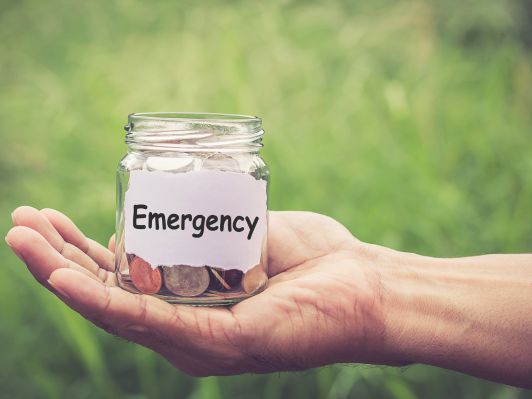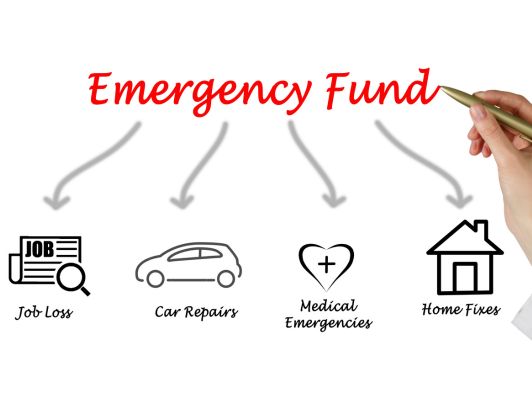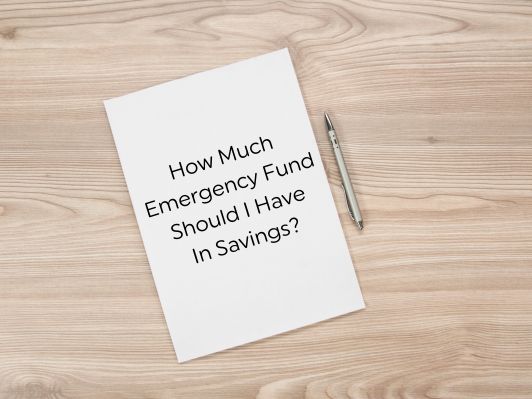An emergency fund is a key part of your money plan. It gives you a safety net when you face sudden costs or money worries.
To protect yourself from shocks like losing your job, rising prices, and other unexpected expenses, it’s best to keep 3 to 6 months of income in an emergency fund. This money should be easy to access when you need it most.
About Emergency Funds
An emergency fund is money you set aside in a bank account that you can reach quickly to cover unexpected expenses. This cash acts as a buffer during financial emergencies like job loss, health issues, car fixes, home repairs, or any urgent money needs.
The main goal of emergency savings is to keep your finances stable. It stops you from borrowing through high-cost debt like credit cards or payday loans when faced with an unexpected bill.
By having a savings fund, you avoid taking on debt, keep your credit score healthy, and stay in control of your money.
Many people use an emergency fund calculator to work out how much they should save based on their monthly outgoings. This helps them prepare for any financial shock that might come their way.
How Much Money Should I Have in an Emergency Fund?

The size of your emergency fund depends on your own situation. Think about your income, what you spend, and how you feel about risk. Most money experts say you should aim to have enough money to cover 3 to 6 months’ worth of living expenses.
But this can change based on how stable your job is, your health status, and family needs you might have. You can find an emergency fund calculator online to help work out the right size for your needs.
For example, the average cost of living in the UK for one person in a one-bed flat is about £1,600 per month. This means if you want to start with 3 months’ worth of expenses, your emergency fund should have £4,800 in it.
How Can an Emergency Fund Help?

Your emergency savings can help you handle many types of money problems:
- Job Loss: Emergency funds can pay for basics like rent or mortgage, bills, food, and other needs while you look for work. Having an emergency fund means you can cover important payments without panic.
- Dental Bills: Dental issues can lead to unexpected bills, even with the NHS. Emergency savings can help with costs not covered and let you focus on getting better.
- Car and Home Repairs: When your car breaks down or your home needs fixing, it can be costly. An emergency fund helps you pay for these unplanned expenses without using credit.
- Unplanned Travel: Sometimes you need to travel at short notice. Emergency funds can cover these unexpected expenses without messing up your budget.
- Family Emergencies: If your family needs help in a crisis, having savings means you can support them without risking your own finances.
Your emergency savings fund helps you cover unexpected costs in all these situations without going into debt.
Where Should I Keep My Emergency Fund?
When choosing where to keep your emergency savings, look for places that offer easy access, safety, and some growth:
- High-Interest Savings Account: Look for accounts from a bank or credit union that offer better rates. These let your emergency fund earn some money while staying easy to access.
- Easy Access Savings Account: These accounts let you get your money quickly with no fees. Most banks and credit unions offer this type of account for emergency funds.
- Cash ISA: A tax-free way to save that may offer competitive interest rates compared to standard savings accounts.
- Money Market Funds: These often pay better interest than standard bank accounts while still allowing access to your cash. Many banks and credit unions offer money market funds as alternatives to traditional savings accounts.
The key is finding a balance between earning some interest on your emergency fund while keeping it available to cover unexpected expenses when needed.
How to Build an Emergency Fund
Building an emergency fund might seem hard at first, but getting started is the biggest step:
- Start small with a goal of saving £500-£1,000 as a mini emergency fund
- Make a budget to track your monthly outgoings
- Cut costs where possible to spend less and save more
- Set up a regular savings plan based on when you get income
- Save before you spend on other things
- Use direct debits to automatically build your emergency savings fund
- Add any extra money like gifts or bonuses to your savings account
- Balance paying off high-interest debt while still creating an emergency fund
- Make emergency savings a higher priority than other savings
- Replenish your fund after you use it
Building an emergency fund is one of the most important steps for financial security. The process helps you develop better money habits overall.
What If I Can’t Save Anything Right Now?
If money is tight and saving seems impossible:
- Review your bills and switch providers to find cheaper services
- Check if you’re getting all the benefits you’re entitled to
- Start very small – even £5 per week adds up over time, and can create a small emergency fund
- When you have money left after paying bills, put aside some of it
- Look for ways to earn a little extra income for your savings account
- Find a bank or credit union with no minimum balance requirements
Even saving tiny amounts builds the habit. Over time, you’ll create a safety net that can cover unexpected events.
Read about how to save money fast on a low income in the UK
Bottom Line
An emergency fund is essential for good money management. It provides protection during surprise situations like:-
- Losing a job
- Income reduction
- Medical bills such as dental or
- Other unplanned expenses.
Aim to save 3 months’ worth of living expenses in your emergency fund. From there, you can build it up based on your needs. It improves your financial well being
Having this money set aside brings peace of mind and helps avoid debt when life throws surprise your way. Once your emergency fund is in place, you can feel more confident about investing other savings for long-term growth. Many financial experts recommend focusing on emergency savings before other forms of investing.
FAQs
Is a 12-month emergency fund too much?
A 12-month emergency fund might seem large, but it depends on your situation. If your job is unstable or you’re self-employed, having a year’s worth of expenses saved can make sense. For most people, 3-6 months is enough, and you could put other forms of savings into investing instead.
Is saving £1,000 a month good in the UK?
Saving £1,000 a month is very good in the UK. This level of saving will help you build a solid emergency fund quickly. After your emergency savings are in place, you might consider investing some of this money for longer-term goals.
Most UK banks recommend having an emergency fund before focusing on other types of investing. This ensures you can cover unexpected costs without derailing your financial plans.
Disclaimer: The information above is for reference only. This is not financial advice.
Related guides:

